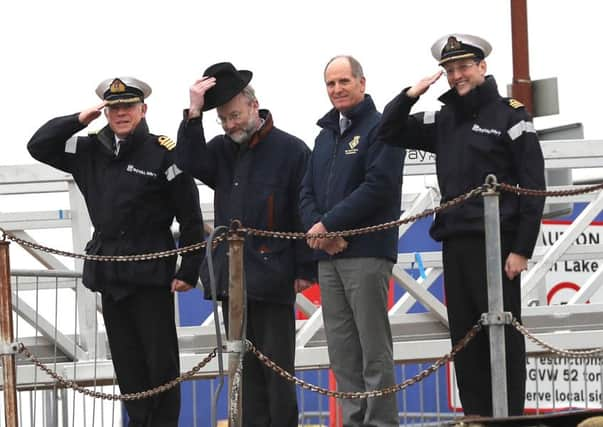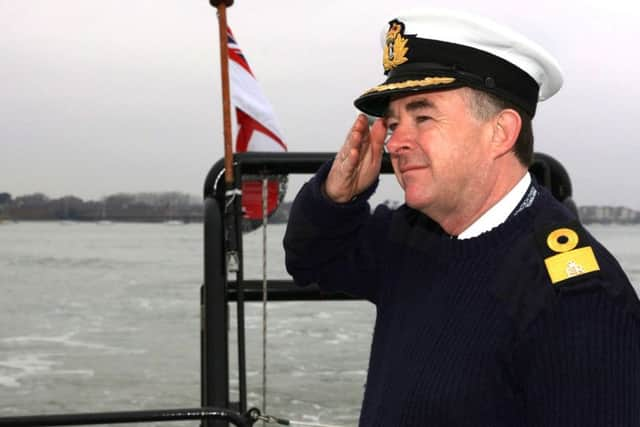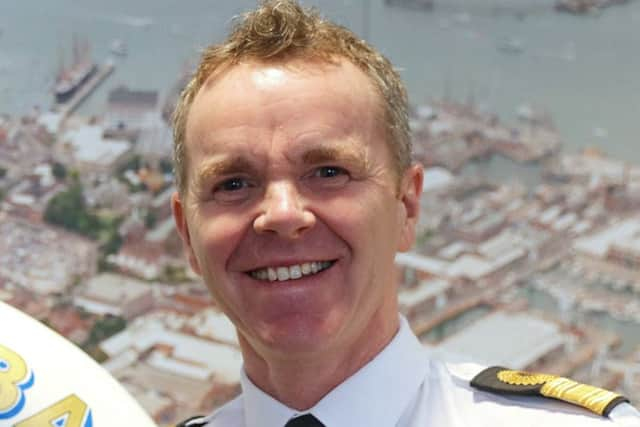Portsmouth Naval Base chief bids farewell after historic six years in charge


But now, after having become the longest-serving naval base commander in Portsmouth since the Napoleonic era, the top officer is finally calling it a day.
He bid farewell to the home of the Royal Navy after having been in charge of Portsmouth Naval Base for a six-year stint – three times longer than most naval base commanders.
Advertisement
Hide AdAdvertisement
Hide AdTaking over the top job is Commodore Jim Higham, who is beginning his first full day in charge of the HQ today.


Speaking at a special ceremony yesterday, Cdre Rigby said: ‘I have had the immense good fortune to have enjoyed six years as the naval base commander.
‘It is the people that make this naval base both successful and such a great place in which to work. The future couldn’t be brighter.
‘We know we have the Type 45s here; we will have at least one class of the frigates based here; the carriers will be here and we will be looking after the minehunters.
Advertisement
Hide AdAdvertisement
Hide Ad‘I wish Commodore Higham the best of luck at such an exciting time.’


Appointed as Captain of the Base in 2011 and promoted to Naval Base Commander (Portsmouth) in 2012, Cdre Rigby cites HMS Queen Elizabeth’s first entry to the base as his obvious highlight in the role.
But the distinguished officer said his 37-year career has been full of highs, from the people he has worked with to the places he has visited.
Reflecting on his lengthy naval service, Cdre Rigby told The News: ‘The experiences I will always remember are the ones where I spent time – a long period of time – as part of an unchanging ship’s company or took part in extreme activities.
Advertisement
Hide AdAdvertisement
Hide Ad‘In the early years of my career I joined a frigate, HMS Hermione, in which the same ship’s company stayed together for two years, and carried out two major deployments east of Suez.


‘That experience created very close friendships that still stand.’
He added battling in a war zone and rescuing refugees are moments he will never forget.
‘I vividly remember the night of the invasion of Iraq in 2003 and keeping operations going in full chemical suits, despite the scud attacks on our desert base,’ he said.
Advertisement
Hide AdAdvertisement
Hide Ad‘Another significant moment in my career was taking part in the evacuations of Lebanon.


‘I was on HMS Bulwark at the time. We lifted 2,500 people in one shift in between the air raids.
‘When you saw the refugees, you felt you were doing the right thing – that was very rewarding and memorable.’
Cdre Rigby joined the navy in 1980 as a logistics officer. As a junior officer he served on patrol boats in Northern Ireland and Hong Kong and the destroyer HMS Exeter conducting Nato Cold War operations in the Atlantic.
Advertisement
Hide AdAdvertisement
Hide AdLater, he served with the Joint Force Headquarters for operations in Rwanda, Congo and Sierra Leone.
In 1996 he joined the Commander UK Task Group Battle Staff embarked in HMS Illustrious and HMS Invincible, during operations off Iraq and Kosovo.
He was promoted to captain in 2007 and in 2009 he became team leader responsible for the acquisition, storage and delivery of all the food and fuel to the UK military worldwide, with a focus on managing the supply chain to Helmand province in Afghanistan.
Since joining the city’s naval base, he has overseen a £100m revamp of the HQ in preparation for the navy’s two 65,000-tonne aircraft carriers, HMS Queen Elizabeth and HMS Prince of Wales, as well as the transformation of the Ship Hall into the Minor War Vessels Centre of Specialisation.
Advertisement
Hide AdAdvertisement
Hide AdAsked what he will do next, the Emsworth resident said: ‘I am going to have some time off working in the garden, have a gap year and go travelling around South America and the Himalayas. Then I might come back and find something rewarding like a charity to work for.’
During his six-year tenure, he has overseen one of the biggest revamps in Portsmouth Naval Base’s history – a legacy that will continue long after his departure.
But when Commodore Jeremy Rigby first took up the role of leading the base in 2012, the military hub’s future was far from secure.
Within a year of taking the reins, defence giant BAE Systems axed almost 1,000 jobs at the base and pulled the plug on shipbuilding in Portsmouth.
Advertisement
Hide AdAdvertisement
Hide AdQuestion marks remained over the site’s future in the wake of the decision.
But ever the optimist, Cdre Rigby said he was determined to make sure the base would remain an integral part of the Royal Navy and of Portsmouth.
Working alongside his team, he went about rearranging the naval base as part of a £100m overhaul in preparation for the arrival of the navy’s two new Queen Elizabeth-class supercarriers.
It was a colossal project, which saw the base’s ageing infrastructure ripped apart and modernised, with a super-strong jetty, capable of handling the two 65,000-tonne leviathans, a high-voltage electrical supply and specialist carrier-specific gangways known as ‘brows’ being fitted.
Advertisement
Hide AdAdvertisement
Hide AdThe refurbishment also saw a new visitor centre installed for the carriers. And there is ongoing work to construct a new electrical power station.
Vacant, the base’s old Ship Hall, was transformed into a repair hub for minehunters, while a new dry dock was opened to maintain frigates and destroyers.
Cdre Rigby said it had been ‘a privilege’ to showcase a ‘really exciting’ programme as naval base boss